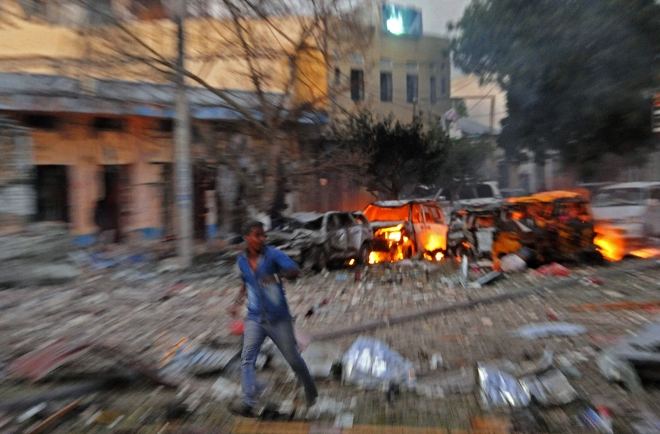
Friday October 20, 2017

File: Mohamed Abduwahab, AFP
Critics have accused the Western media of under-reporting a recent terrorist attack in the Somalian capital Mogadishu that left at least 300 people dead and hundreds more seriously injured.
Saturday’s attack, the deadliest in Somalia’s recent history, came little more than a week after a mass shooting in Las Vegas in which 59 people died, “but many noted a quieter response to events in Mogadishu”, says Al Jazeera English.
It’s an accusation that has been made repeatedly, but is it true that terrorist incidents outside Western Europe and the US receive less international attention?
What do critics say?
“I hate comparing human tragedies, but the mainstream media makes you do it,” tweeted Khaled Beydoun, a law professor at the University of Detroit.
Other critics, including Itayi Viriri, a spokesperson for the International Organization for Migration, also highlighted the limited response on social media.
Why aren’t we all with Somalia today? @Facebook? @Twitter? #Celebs? Anyone?
— Itayi Viriri (@itayiviriri) October 16, 2017
“Coverage of terrorist attacks is massively biased,” says Sophia McClennen, professor of international affairs and at Pennsylvania State University, in an article on Salon.
Comparing bombing in Manchester and Baghdad that occurred within a week of each other in May, she says: “When the targets are neither white nor Western, and are Islamic, the sense of personal tragedy is almost entirely absent.”
What do those in the media say?
There “absolutely is room for debate about the proportionality of coverage”, said British journalist Martin Belam on blogging platform Medium following similar criticism in the wake of the terrorist attacks in Paris, Beirut and Baghdad in November 2015. “But to say that the media don’t cover terrorism attacks outside of Europe is a lie.”
Even when reported, the coverage of attacks in the Middle East and Africa attracts far less interest from American and European viewers, according to Charlie Beckett, a media professor at the London School of Economics.
“This is partly because overall audiences will always respond more to news that has relevance to their own lives,” he writes in the Columbia
Journalism Review.
Nesrine Malik, a London-based Sudanese writer and commentator, agrees that readers are somewhat complicit in the disparity in coverage.
“There is something sanctimonious, maybe even hypocritical, about placing the onus purely on the media,” she argues in an article for The Guardian.
Another common argument is that coverage in some countries is higher because terrorism in those countries is less common. “A mass attack in the heart of Paris is a less frequent event than a bombing in the Middle East,” says Malik. “It sounds churlish, but that is news.”
What are the facts?
A study conducted for The Nation last year found that attacks in Western countries are covered far more often “and with more depth and heart” than attacks in non-Western countries.
Lawyer and journalist Sean Darling-Hammond collected data on each of the 334 reported incidents of terrorism in 2015, including where the attack happened, the number of casualties, and how much coverage the incident received on the day of the attack.
Among them were massacres in France, Lebanon and Iraq, all of which were claimed by Islamic State militants.
“The results were shocking,” he says. “The argument that media institutions covered the November attacks in Paris, Beirut, and Baghdad in equal measure isn’t just unsupported, it’s glaringly false.
“On the day of each respective attack, there were 392 articles online about the attack in Baghdad and 1,292 articles about the attack in Beirut. On the day of the Paris attack, there were over 21,000.”
Overall, there were approximately 665 articles per person who died in a Western terrorist incident in 2015, according to his research. For each non-Western death, roughly 60 articles were published.
“If the number of articles written is any expression of how much the media care about a victim of terrorism, then the media care 11 times less about victims of non-Western terror incidents,” Darling-Hammond says.
A much larger statistical analysis carried out by Milo Beckman for news website FiveThirtyEight in 2016 yielded similar results.
Comparing more than 40,000 terrorist attacks that took place between 1968 and 2009, Beckman concluded that attacks in the West are consistently over-reported in the US press relative to similar attacks elsewhere.
The disparity in coverage appears to be qualitative as well as quantitative. “Attacks in non-Western countries were covered in a detached style, with little focus on victims - unless they’re from the West,” says Darling-Hammond.
“It almost seemed like there was a formula for non-Western coverage: weapon, location, death count, group responsible, political ramifications,” he continues. “But when Westerners were killed, whether at home or abroad, coverage seemed to have more heart.”
Who is right?
The evidence suggests that criticism of such media coverage is not unfounded, with terrorist attacks receiving far less international attention if they occur outside the US and Europe.